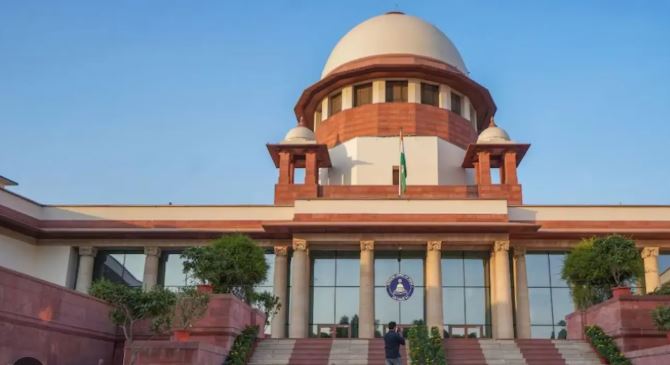Indian Supreme Court urged to set deadline for restoring IIOJK statehood
Former bureaucrats, military officers write open letter to Chief Justice B.R. Gavai
NEW DELHI: A group of five petitioners comprising former Indian civil bureaucrats and military officers have demanded that a Supreme Court bench should hear petitions on the unconstitutional removal of Indian illegally occupied Jammu and Kashmir’s statehood by Modi government in August 2019.
In an open letter to the Chief Justice of India, B.R. Gavai, the petitioners deplored that the occupied territory has not yet regained the statehood that was seized from it in August 2019.
The petitioners included former Indian Home Secretary Gopal Pillai, Major General (retired) Ashok K. Mehta, Vice-Marshal (retired) Kapil Kak, former member of Interlocutors for Kashmir Radha Kumar and a former Indian secretary of the Inter-State Council Amitabha Pande.
The group highlighted the Indian Supreme Court’s statement during the judgement, that it was “not ruling on the constitutionality or unconstitutionality of demoting an existing state in its entirety to two Union Territories, because the Solicitor-General had assured it that statehood would be restored at an appropriate time”.
“The Union administration’s repeated assurances that statehood will be restored, both in parliament and through the Solicitor-General eighteen months ago, suggest a tacit recognition that the removal of statehood is unconstitutional,” they said.
The letter also stated that the solicitor general’s statement before the Supreme Court bench in December 2023, that statehood would only be restored “in stages” nullifies the constitutional issue that no state can be demoted to a union territory in its entirety. The group said that such a policy puts all [Indian] states at the risk of similar actions being taken against them.
In the context of the recent Pahalgam attack, they said that this is exactly the time to restore statehood. “The high turnout in the October 2024 assembly elections with no violence, and the absolute majority electors gave the National Conference, a regional party, indicated the people had voted for an elected administration with the strength to govern according to public aspirations,” they said. “The most effective bulwark against such vitiation is restoration of civil and political rights, including oversight institutions, that will come with statehood,” they said.
They have demanded that the CJI constitute a bench of the Supreme Court to hear petitions on the unconstitutionality of the removal of Indian illegally occupied Jammu and Kashmir’s statehood, seeking an early deadline for its restoration and ensuring that no future government is able to abrogate existing statehoods.
India faces regional setback at SCO
India faced diplomatic isolation at the recent Shanghai Cooperation Organisation (SCO) Defence Ministers’ meeting in Qingdao, where its attempt to push a unilateral narrative on the April 22 Pahalgam incident was firmly rebuffed.
The final joint communiqué made no mention of the event, reportedly due to the lack of consensus among member states while the joint declaration condemned the attack on Jaffar Express in Balochistan.
Indian Defence Minister Rajnath Singh refused to sign the final protocol, claiming it failed to reflect India’s concerns on terrorism. However, officials familiar with the proceedings said India presented its proposed language after expert-level negotiations had concluded—leaving no room for meaningful discussion. One Pakistani official, commenting on background, said India appeared “increasingly isolated,” with its “one-eyed obsession with Pahalgam” finding little support.
In contrast, Pakistan used the forum to advocate for collective regional stability. Defence Minister Khawaja Muhammad Asif reiterated Islamabad’s commitment to peace, cooperation, and joint counterterrorism efforts. He called for an end to cross-border terrorism and specifically highlighted Balochistan as a region targeted by foreign-sponsored violence—citing attacks such as the one on the Jaffar Express.
“Let us not politicize the war against terrorism,” Asif said, urging SCO states to move beyond blame games and engage in constructive dialogue.
Pakistan’s call for regional harmony is reinforced by domestic efforts to pacify long-troubled areas like Balochistan—efforts rooted in dialogue and development rather than repression. A compelling case in point is the life story of Mir Hazar Khan Marri, a former militant commander who turned champion of reconciliation and a leading peacemaker.
As chronicled in Ammar Masood’s book ‘From Rebellion to Reconciliation: The Remarkable Journey of Mir Hazar Khan Marri’, the Bloch leader’s transformation underscores the potential of inclusive policies. Once in exile in Afghanistan following a militant career, Marri returned to Pakistan in the 1990s as a changed man. Rather than resume armed resistance, he chose the path of reconciliation—meeting successive Pakistani leaders, including Benazir Bhutto, General Pervez Musharraf, and Bilawal Bhutto-Zardari, to press for development in underprivileged Baloch areas such as Kohlu.
Rejecting separatist calls, Marri championed dialogue and reintegration. He convened local jirgas, advocated for peaceful resolutions to tribal grievances, and remained committed to Pakistan’s constitutional framework—becoming a powerful symbol of what post-conflict rehabilitation can look like.
His journey sharply contrasts with the image India attempts to project of Balochistan as a perpetual conflict zone. While India levels unsubstantiated allegations, Pakistan points to tangible examples of peace building—backed by stories of former insurgents now working within the system for emancipation, reform and development.
As India grapples with diplomatic pushback at regional forums, Pakistan’s steady embrace of inclusion and reconciliation is increasingly earning it international credibility. In the evolving regional landscape, narratives rooted in engagement appear to be prevailing over those built on antagonism. Monitoring Desk




